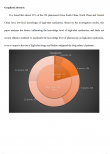A study on the factors influencing pharmacists' knowledge level in high-alert medication: a convenient sample survey in China
Abstract
Background Compared with general drugs, the consequences of errors in high-alert medication are more severe. Improving pharmacists' knowledge level of high-alert medication is of great significance for improving drug safety and maintaining patients' health.
Objective To understand the current situation of Chinese hospital pharmacists' knowledge level of high-alert medication and explore its influencing factors, so as to provide management suggestions for high-alert medication.
Methods 380 pharmacists from four hospitals in south, north and central China were selected by convenient sampling method. Through questionnaire survey, the characteristics of demographic sociology and the status quo of knowledge level in high-alert medication were investigated. Chi-square test and Binary Logistic regression were used to analyze the influencing factors of pharmacists' knowledge level in high-alert medication.
Results A total of 336 valid questionnaires were recovered, with an effective recovery rate of 88.4%. Among the respondents, 79.2% have a high level of high-alert medication knowledge. The analysis results show that work experience and professional title, whether to obtain high-alert medication knowledge through the network, whether to obtain high-alert medication knowledge through daily work, whether the knowledge of high-alert medication is obtained through external channels, and whether the knowledge of high-alert medication is re-examined before use are the main factors affecting pharmacists' knowledge level of high-alert medication.
Conclusion Increasing work case sharing and knowledge cooperation, rationally arranging the work scope of each pharmacist, and improving the hospital management mode are helpful to improve pharmacists' cognitive level of high-alert medication and improve the hospital's ability to control the risk of high-alert medication.


